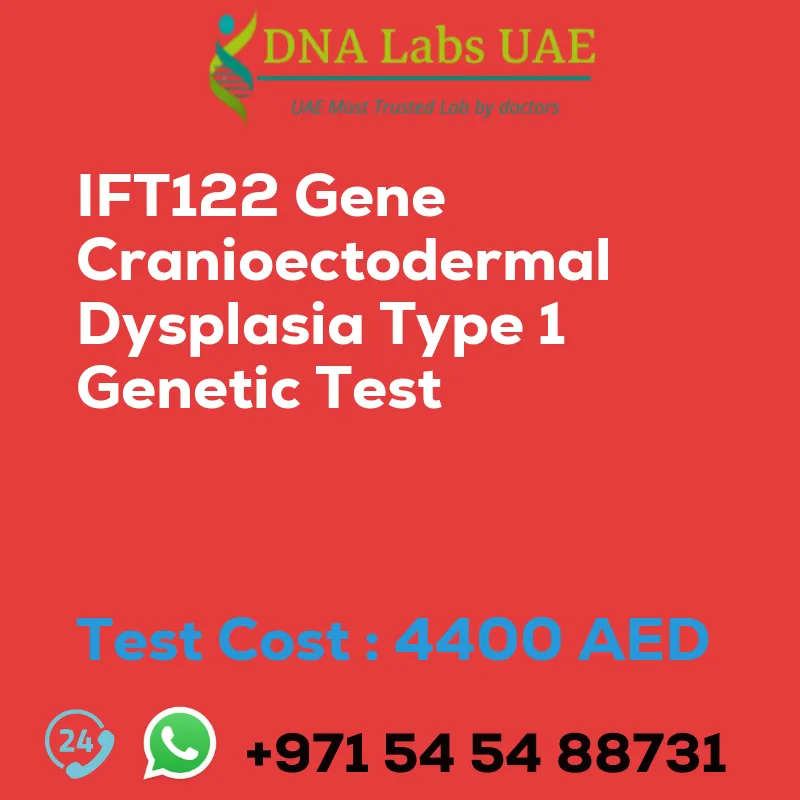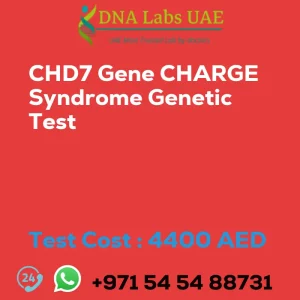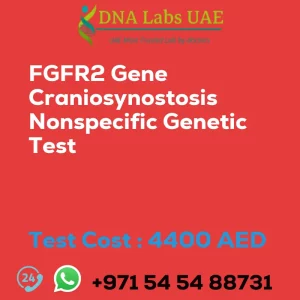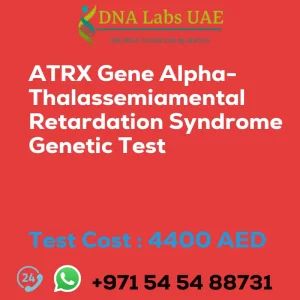IFT122 Gene Cranioectodermal dysplasia type 1 Genetic Test
At DNA Labs UAE, we offer the IFT122 Gene Cranioectodermal dysplasia type 1 Genetic Test at a cost of AED 4400.0. This test is used to diagnose and identify mutations in the IFT122 gene that are associated with cranioectodermal dysplasia type 1.
Test Components and Price
The IFT122 Gene Cranioectodermal dysplasia type 1 Genetic Test is priced at AED 4400.0. The sample condition required for this test can be blood, extracted DNA, or one drop of blood on an FTA card. The report delivery time is estimated to be 3 to 4 weeks. The method used for this test is NGS (Next-Generation Sequencing) technology. The test type is Dysmorphology and it falls under the Genetics department.
Pre Test Information
Prior to undergoing the IFT122 Gene Cranioectodermal dysplasia type 1 NGS Genetic DNA Test, it is important to provide the clinical history of the patient. Additionally, a genetic counseling session may be conducted to draw a pedigree chart of family members affected by the IFT122 Gene Cranioectodermal dysplasia type 1 NGS Genetic DNA Test gene (IFT122).
Test Details
The IFT122 gene cranioectodermal dysplasia type 1 NGS genetic test is a diagnostic test that helps identify mutations in the IFT122 gene associated with cranioectodermal dysplasia type 1. This rare genetic disorder affects the development of the craniofacial region, ectodermal structures (such as hair, teeth, and nails), and other organs.
Mutations in the IFT122 gene disrupt the normal functioning of cilia, which are tiny hair-like structures on the surface of cells that play a crucial role in various cellular processes. The NGS technology used in this test allows for the simultaneous analysis of multiple genes, including the IFT122 gene, to identify any disease-causing mutations.
The test involves sequencing the DNA of the patient and comparing it to a reference genome to identify any genetic variations or mutations. The results of this test can help confirm a diagnosis of cranioectodermal dysplasia type 1 and provide valuable information for genetic counseling and management of the condition. It can also help guide treatment decisions and provide insight into the underlying genetic mechanisms of the disease.
For more information or to schedule an appointment for the IFT122 Gene Cranioectodermal dysplasia type 1 Genetic Test, please contact DNA Labs UAE.
| Test Name | IFT122 Gene Cranioectodermal dysplasia type 1 Genetic Test |
|---|---|
| Components | |
| Price | 4400.0 AED |
| Sample Condition | Blood or Extracted DNA or One drop Blood on FTA Card |
| Report Delivery | 3 to 4 Weeks |
| Method | NGS Technology |
| Test type | Dysmorphology |
| Doctor | Pediatrics |
| Test Department: | Genetics |
| Pre Test Information | Clinical History of Patient who is going for IFT122 Gene Cranioectodermal dysplasia type 1 NGS Genetic DNA Test. A Genetic Counselling session to draw a pedigree chart of family members affected with IFT122 Gene Cranioectodermal dysplasia type 1 NGS Genetic DNA Test gene IFT122 |
| Test Details |
IFT122 gene cranioectodermal dysplasia type 1 NGS genetic test is a diagnostic test used to identify mutations in the IFT122 gene that are associated with cranioectodermal dysplasia type 1. Cranioectodermal dysplasia type 1 is a rare genetic disorder characterized by abnormal development of the craniofacial region, ectodermal structures (such as hair, teeth, and nails), and other organs. Mutations in the IFT122 gene disrupt the normal functioning of cilia, which are tiny hair-like structures on the surface of cells that play a crucial role in various cellular processes. The NGS (Next-Generation Sequencing) technology used in this test allows for the simultaneous analysis of multiple genes, including the IFT122 gene, to identify any disease-causing mutations. It involves sequencing the DNA of the patient and comparing it to a reference genome to identify any genetic variations or mutations. The results of this test can help confirm a diagnosis of cranioectodermal dysplasia type 1 and provide valuable information for genetic counseling and management of the condition. It can also help guide treatment decisions and provide insight into the underlying genetic mechanisms of the disease. |








